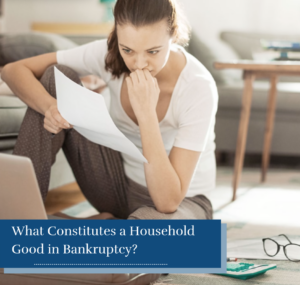What Constitutes a Household Good in Bankruptcy?

Exempt Property in a North Carolina Bankruptcy
Some people avoid filing bankruptcy because they believe they’ll have to give up all their assets. However, an individual debtor is allowed to exempt certain property from the bankruptcy.
For more information on filing bankruptcy and what property you can exempt, contact the board-certified bankruptcy lawyers at Sasser Law Firm today.
What Is Exempt Property?
Bankruptcy law permits some of your assets to be exempt during bankruptcy, allowing you to keep a certain amount of your property. Most exempt property ensures the debtor still has the necessities of life, especially those that enable them to continue living and working.
What Assets Are Exempt from Bankruptcy?
Filing for bankruptcy doesn’t mean you have to start over with nothing. You may exempt the following property in a North Carolina bankruptcy:
● Your home, up to $35,000 of equity in most cases or $60,000 in some cases
● Your car, up to $3,500 in equity
● $5,000 in wildcard exemption if the home exemption is not fully used
● Tools of the trade up to $2,000
● Life insurance where a spouse or child is the beneficiary
● Prescribed health aids
● Retirement plans
● Qualifying college savings, up to $25,000
● Alimony and child support
If a married couple files jointly and jointly owns assets then the exemptions are doubled. If an individual files bankruptcy and jointly owns an asset with another person then only the debtor’s interest is considered and not the interest of the non-debtor
Household Goods in a North Carolina Bankruptcy
NC General Statute 1C-1601(a)(4) provides that a debtor may keep their aggregate interest up to $5,000 in value plus $1,000 for each dependent of the debtor, not to exceed $4,000 for dependents. The exempt property includes household furnishings, household goods, wearing apparel, appliances, books, animals, crops, or musical instruments. It must be held primarily for
the debtor’s personal, family, dependent, or household use. The amounts would be different for a married couple filing a joint bankruptcy.
This statute applies in bankruptcy cases where the debtor is claiming the North Carolina exemptions. If the debtor has not lived in North Carolina for at least 730 days, a different set of exemptions may be claimed. In Chapter 7 bankruptcy, there is the potential for the debtor to lose assets. In Chapter 11 bankruptcy and Chapter 13 bankruptcy, the debtor is permitted to retain all assets, even if not exempt.
In the 4th circuit (where North Carolina is located), the case frequently cited to determine the sort of items that can be claimed through the household goods exemption is In re McGreevy. This case adopted the functional nexus test and provides that an item qualifies as a household good when it is used to support and facilitate daily life within the house. Pots and pans serve that function, but a model car collection does not.
In addition to the household goods exemption, North Carolina provides other exemptions for tangible items of personal property which may be utilized to exempt household goods.
Contact a North Carolina Bankruptcy Lawyer to Explore Your Options
Don’t let uncertainties about bankruptcy proceedings prevent you from considering all your options. Contact us today for a free consultation with one of our experienced North Carolina bankruptcy attorneys. We can discuss your legal options and answer your questions so you can take control of your finances.
This post was originally published in February 2014 and has been updated for accuracy and comprehensiveness in May 2022
- About the Author
- Latest Posts
For more than 20 years, the Sasser Law Firm has been helping individuals and business owners sort through financial hardships to see the light at the end of the tunnel. Our North Carolina bankruptcy attorneys are all board-certified specialists, which means we have passed a complex exam, undergone a thorough peer review, and continue to earn legal education credits in this ever-evolving area of law.














